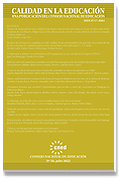Challenges of Quality Assurance for Vocational Education and Training institutions Facing the Mandatory Accreditation System in Chile.
DOI:
https://doi.org/10.31619/caledu.n56.1133Keywords:
vocational education and training, quality assurance, cluster analysis, higher education, postsecondary education, classificationAbstract
This research addresses a comprehension of diversity and future challenges of the Vocational Education and Training institutions, from the perspective of a new characterization. This work classified this group of institutions in 4 main clusters, built from a statistical analysis of education public databases.
The significance of this study emerged from the new requirements for accreditation established by Higher Education Act (21.091), which, from the view of these authors, set specific tensions to this education segment.
From the perspective of these authors, two specific factors retard the Vocational Education and Training system development. On one hand, there is an unfulfilled promise for this system, in terms of articulation and quality. On the other hand, despite important advances in recent years, higher education continues to have a strong focus on universities, not recognizing the particularities and diversity of the VET system.
This research aims to contribute to the quality assurance system through a new methodological approach to this sector, seeking to characterize needs and challenges for each of the identified clusters.
Downloads
Published
Issue
Section
License
Authors retain their Copyright and only transfer a part of these to the journal, accepting the following conditions:
Authors keep their rights as authors and guarantee the right to the journal for the first publication of their work, which is simultaneously subject to the Creative Commons Attribution license allowing third parties to share the study accrediting the author and first publication in this journal.
Authors may adopt other non-exclusive license agreements for distribution of the version of the published work (e.g. inclusion in an institutional thematic file or publication in a monographic volume) accrediting initial publication in this journal.
Authors are allowed and recommended to share their work over the Internet (e.g. in institutional telematic files or their website) before and during the submission process, which may lead to interesting exchanges and increased citation of the published work. (See The effect of open access).

